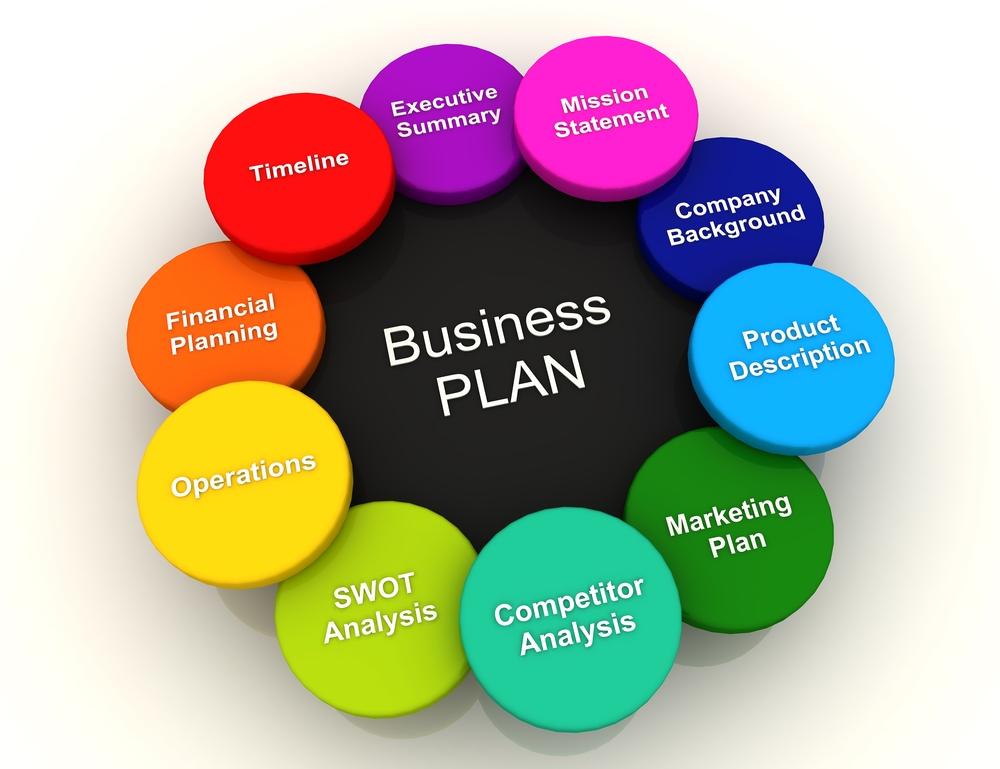How To Start A Small Business From Best Ideas to Plan
 |
| How To Start A Small Business. Photo KnowInsiders |
| Contents |
Deciding how to start a small business can seem like a daunting prospect if you’ve never done it before. Luckily, plenty of other entrepreneurs have, and you can benefit through the wisdom they gleaned from their successes—and their business mistakes.
How to start a small business
These steps on how to start a business will help you with everything from finding and validating your money-making idea to figuring out your shipping strategy to finally launching your product or service.
1. Get a strategic business plan
If you want to truly capitalize on a business opportunity, you have to have a strategy.
A business plan is the living structure of your company. It creates a pathway for success and lays out strategies for revenue, marketing, hiring, profit margins, competition and competitive advantages. You'll also use your plan to share your vision with potential investors, bank-loan officers and even new company managers and branding experts.
While wandering is fine for adventures, it’s far from ideal for starting a business or turning a struggling one around. A high-level strategy can help you build some much-needed momentum — and with the right template strategic plan, you can ride into the unknown with confidence.
2. Incorporate your company
The business formation process can be contracted out to professionals or handled piece-by-piece as you go along. If you work with a company that offers this kind of service, it can also handle many of the tasks in the following steps for you. Unless you plan to work as a sole proprietorship, which has different rules and can often be managed the same way as freelance work, you'll want to create an LLC or limited liability corporation. You can learn more about which business structure to choose on the Small Business Administration's website.
3. Get a Tax ID number
In most instances, a small-business owner will need to file for a Taxpayer Identification Number (TIN), which the Internal Revenue Service (IRS) uses to administrate tax laws. It is issued either by the Social Security Administration (SSA) or by the IRS. According to IRS.gov, a tax ID number is not required if you operate a sole proprietorship or an LLC with no employees. However, if you plan to have employees, you will need to get an Employer Identification Number (EIN) that they can use for filing taxes. An EIN can be applied for online if your business is located in the United States or U.S. Territories, and you'll first need to have a TIN to apply for an EIN.
4. Get a business license
Your business licensing requirements may differ depending on the city, state or county in which you are doing business and the kind and size of business you plan to start. For example, in some states, sole proprietors do not need to acquire a business license (though certain companies and services have individual licensing and permit requirements). This is one of the kinds of services a business-formation company can assist you with or even handle on your company's behalf.
5. Create a brand
Branding is about more than a clean, eye-catching logo and a standard set of colors you use for things like product packaging, business cards and your website. Those things are vitally important — and often overlooked — but the tone of the words in your marketing materials and how your images, graphics and products make customers or clients feel is also a part of your branding. Decide what the emotional resonance of your company should be and then use that to inform all your branding choices. Once you've decided on a look and feel, stick with it. Consistency of messaging is vital to brand awareness.
6. Build a website
A good business website is more than just due diligence for business owners in 2021. It's essentially a fundamental part of the business creation process, and it is nearly impossible to do effective business without one, much less reach your growth and sales potentials. Contract with a reputable full-service company, work with a talented freelancer or even create a simple yet effective landing-style homepage yourself; whatever it takes, get a web presence up and running by the time you're ready to launch.
7. Get a business bank account
This may seem like an extra step when you're in the thick of business planning, but choosing a bank that goes the extra mile for small businesses is vital to your success. Look for dedicated business checking accounts with low or no fees, small starting deposits, ATM accessibility in your area, interest-earning accounts and online or mobile banking tools geared toward making small-business processes easier.
8. Plan and execute a digital-marketing strategy
Digital is the name of the game now; it's not a trend or something new everyone is looking to get into. Digital marketing, whether it's finding an influencer to partner with or creating just the right voice for social, is going to play a central role in how you get the word out about your business. Look for social-media-marketing managers who are agile and able to keep up with the ever-changing social world. Chances are, they'll be able to handle any other digital-marketing needs you have and even suggest new channels for growing your customer base.
Owning a business is a lifelong project, and small-business owners put their hearts and souls into their companies day in and day out. But taking that leap into entrepreneurship doesn't really have to be, well, a leap.
What Is A Business Plan?
 |
| Photo actioncoach |
A business plan is a written document that describes in detail how a business—usually a startup—defines its objectives and how it is to go about achieving its goals. A business plan lays out a written roadmap for the firm from marketing, financial, and operational standpoints.
Business plans are important documents used for the external audience as well as the internal audience of the company. For instance, a business plan is used to attract investment before a company has established a proven track record or to secure lending. They are also a good way for companies' executive teams to be on the same page about strategic action items and to keep themselves on target towards the set goals.
Although they're especially useful for new businesses, every company should have a business plan. Ideally, the plan is reviewed and updated periodically to see if goals have been met or have changed and evolved. Sometimes, a new business plan is created for an established business that has decided to move in a new direction.
READ MORE: Top 10 Most Powerful Women In Business Of The World Today
How to make a business plan?
 |
| Photo tweekbiz |
1. Executive summary
This is the first page of your business plan. It should include a mission statement, which explains the main focus of your business, as well as a brief description of the products or services offered, basic information such as ownership structure, and a summary of your plans.
2. Company description
This section provides a snapshot of your small business. It contains important information including its registered name, address of any physical locations, names of key people in the business, history of the company, nature of the business and more details about products or services that it offers or will offer.
3. Objective statement or business goals
An objective statement should clearly define your company’s goals and contain a business strategy that details how you plan to achieve them. It spells out exactly what you’d like to accomplish, both in the near term and over the long term.
If you’re looking for outside funding, you can use this section to explain why you have a clear need for the funds, how the financing will help your business grow, and how you plan to achieve your growth targets. The key is to provide a clear explanation of the opportunity presented and how the loan or investment will grow your company.
For example, if your business is launching a second product line, you might explain how the loan will help your company launch the new product and increase its sales by 50% over the next three years.
4. Business and management structure
Here, you’ll list your business’s legal structure — such as a sole proprietorship, partnership or corporation — as well as key employees, managers or other owners of the business. It should also include the percent ownership that each owner has and the extent of each owner’s involvement in the company.
5. Products and services
In this section, you can detail the products or services you offer or plan to offer. It should include the following:
An explanation of how your product or service works
The pricing model for your product or service
The typical customers you serve
Your sales and distribution strategy
Why your product or service is better than what the competition is offering
How you plan to fill orders
You can also discuss current or pending trademarks and patents associated with your product or service.
6. Marketing and sales plan
This is simply an explanation of what your marketing strategy is and how you will execute it. Here, you can address how you plan to persuade customers to buy your products or services, or how you will develop customer loyalty that will lead to repeat business. This section can also highlight the strengths of your business and focus on what sets your business apart from your competition.
7. Business financial analysis
If you’re a startup, you may not have much information on your business financials yet. However, if you’re an existing business seeking small-business loans, you’ll want to include income or profit-and-loss statements, a balance sheet that lists your assets and debts, and a cash flow statement that shows how cash comes into and goes out of the company.
You may also include ratios that highlight the financial health of your business, such as:
Net profit margin: the percentage of revenue you keep as net income
Current ratio: the measurement of your liquidity and ability to repay debts
Accounts receivable turnover ratio: a measurement of how frequently you collect on receivables per year
8. Financial projections
This is a critical part of your business plan if you’re seeking financing or investors. It outlines how your business will generate enough profit to repay the loan or how you will earn a decent return for investors.
Here, you’ll provide your business’s monthly or quarterly sales, expenses and profit estimates over at least a three-year period — with the future numbers assuming you’ve obtained a new loan. Accuracy is key, so carefully analyze your past financial statements before giving projections.
Your goals may be aggressive, but they should also be realistic. “It’s OK to be optimistic if you can justify it,” Allen says. “In general, you don’t want to stand out in a negative way by being too optimistic.”
You want to show that your business can generate strong enough cash flow to cover the regular debt payments on a loan. But you should also address the various risk factors of the business, Allen says.
“The loan officer is definitely going to want to know that you’ve thought through all of the potential risks and that you’ve mitigated those risks in some way,” he says.
9. Appendix
List any supporting information or other additional information that you couldn’t fit in elsewhere, such as resumes of key employees, licenses, equipment leases, permits, patents, receipts, bank statements, contracts, and personal and business credit history. If the appendix is long, you may want to consider adding a table of contents at the beginning of this section.
Business plan tips and resources
Now that you’ve written your business plan, here are some tips to help your hard work stand out:
Avoid over-optimism: If you’re applying for a business loan at a local bank, the loan officer likely knows your market pretty well. Providing unreasonable sales estimates can hurt your chances of loan approval.
“They know what you can expect sales to be for that type of business in that market,” Allen says. “If you walk in with a sales forecast 50% higher than other businesses, they are going to know that you are not being realistic, and that’s going to work against you.”
Keep it concise: All you need is 15 to 25 pages for a good business plan, as long as the plan is clear, concise and contains all of the relevant information, Allen says.
Focus on the key elements of your business plan and avoid getting too bogged down by the technical aspects of your business or using too much industry jargon. You can always put supporting information or other important details in the appendix.
Proofread: Spelling, punctuation and grammatical errors can jump off the page and turn off lenders and prospective investors, taking their mind off your business and putting it on the mistakes you made. If writing and editing aren't your strong suit, you may want to hire a professional business plan writer, copy editor or proofreader.
“I always feel like if the person can’t even bother to proofread something that they wrote, how detail-oriented is this person in running their business?” Allen says.
Use free resources: SCORE is a nonprofit association that offers a large network of volunteer business mentors and experts who can help you write or edit your business plan. You can search for a mentor or find a local SCORE chapter for more guidance.
The U.S. Small Business Administration’s Small Business Development Centers, which provide free business consulting and help with business plan development, can also be a resource.
READ MORE: Top 5 Cheapest & Most Expensive States for Running A Business In America
Best Small Business Ideas
 |
| Photo KnowInsiders |
1. Handyman
Are you always fixing things around the house? Often on-call when friends need small projects completed? Create a website, conduct a competitive analysis to determine what your time and expertise are worth, and turn to the friends you’ve helped before for referrals.
2. Woodworker
Similarly, if you have a passion for crafting beautiful furniture or other home goods out of wood, that could be a small business niche for you. Get started by listing a few of your pieces on sites like Etsy. Once you build a following, consider starting a website, accepting custom orders, or expanding to refinishing work and upholstery.
3. Online Dating Consultant
Dating consultants usually charge for their time. They help people create successful online dating profiles, source possible matches from outside the typical online channels, and offer a level of personalization that a site like Tinder can’t. Think you’ve got a knack for the match? This might be the business for you.
4. Sewing and Alteration Specialist
People will always need clothing hemmed and buttons mended — and you could be the person to do it. If you love sewing, start by offering simple services like those mentioned above and expand your repertoire to dressmaking and design as you build a customer base and demand.
5. Freelance Developer
From building websites for other small businesses to providing technical support for certain projects, quality web development is in high demand right now. As a web developer, you'll naturally have a technical skill set. Distill your knowledge and expertise so customers who don't have your experience are able to understand what it is you'll be helping them achieve.
To help with this, test your messaging on friends and family who don’t have a firm understanding of the work you do. If they’re able to summarize what you do, your messaging is likely effective among people outside of your industry.
6. Personal Trainer
Offer in-home consultations, personalized nutrition and exercise regimens, and community boot camps to get the word out. Don’t forget to populate an Instagram feed with inspirational quotes, free exercise videos, and yummy snack ideas as well — it’s a common way for fitness gurus to build their brands in our digital world.
If you choose to go this route, it’s OK to start small at first, then scale up. For instance, MOURfit is a personal training business in Indianapolis that started in a shared gym, then grew to a private gym that offers group fitness, personal training, and nutrition services.
7. Freelance Graphic Designer
Set your own hours, choose your projects, and build a portfolio and business you’re proud of. From website design to blog graphics and more, many companies seek out experienced graphic designers for support on a variety of projects.
If you’re just starting out with graphic design, try these eight tips and tricks that are ideal for beginners. If you’re more experienced but need to build your portfolio to attract clients, these prompts will get your creativity flowing in no time.
8. Life/ Career Coach
If you have experience navigating career, personal, and social transitions successfully, put it to good use as a life or career coach. Many of us are looking for guidance in our careers — and finding someone with the time to mentor us can be tough.
Life/career coaches don’t come cheap, but they are able to offer clients the intense and hands-on training and advice they need to make serious moves in their personal and professional lives. After all, everyone needs some uplifting advice from time to time.
Looking for inspiration? Nariah Broadus has dedicated more than 20 years to helping people create better working environments and navigate change successfully as a career and leadership coach. Check out her story for more inspiration to get started with this small business idea.
9. Resume Writer
Creating a resume, cover letter, and — when necessary — portfolio for a new job can be tough and time consuming. That’s why many people hire help. Assist clients with tailored resumes, beautifully edited cover letters, and carefully-crafted portfolios that make it impossible for employers to ignore.
10. Freelance Writer
If you have writing skills, there’s someone out there willing to pay you for them. Write blog posts, magazine articles, and website copy galore — just make sure you have a body of work built up to share with potential clients. Even if you create a few sample pieces to have on hand, they’ll help exhibit your work and attract new business.
 Top 4 Zodiac Signs Seems to Conclude a Business Deal this Week Top 4 Zodiac Signs Seems to Conclude a Business Deal this Week According to Astrology, this week would be a great opportunities for these 4 zodiac signs to succesfully gain a business deal. Keep reading to know ... |
 Top 5 Zodiac Signs Born to be Bussinessman Top 5 Zodiac Signs Born to be Bussinessman If you already know your star sign you are probably aware of the personality traits associated with your zodiac. But what about the characteristics relevant ... |
 2021 Career Horoscope: The Best Job For Your Zodiac Sign 2021 Career Horoscope: The Best Job For Your Zodiac Sign 2021 Career Horoscope - The Best Job For Your Zodiac Sign: How to choose your right career in 2021 with astrology. Select your zodiac sign ... |
























